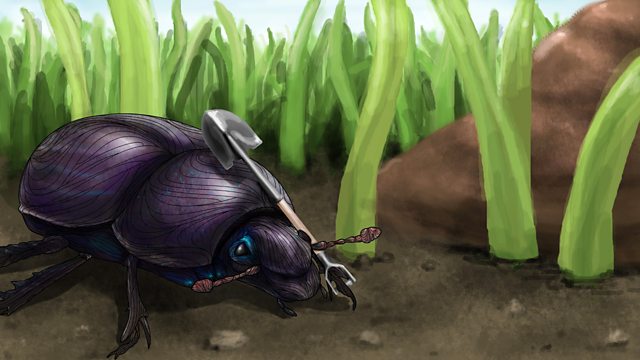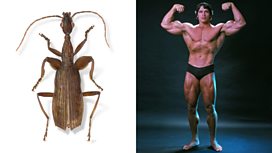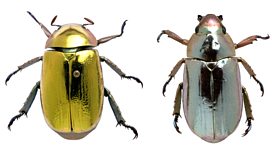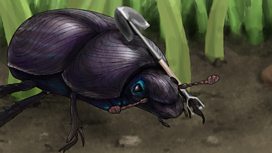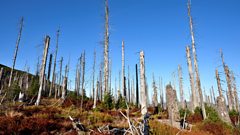Beetles
Beetles represent twenty percent of all living species. Brett Westwood explores how they have influenced arts and science around the world. From 2015
Beetles, in the group of insects known as Coleoptera or 'sheathed wing', make up roughly one quarter of all known living species on the planet, that's about 400,000 species. It's perhaps not surprising that beetles are at the heart of the many ways we take inspiration from nature.
"Ladybird, ladybird, fly away home,
Your house is all burned and your children are gone....."
This nursery rhyme is one of many across Europe that demonstrates our close relationship with ladybirds. Peter Marren, leading wildlife author, explains the story behind the rhyme and why the ladybird in folklore is seen as 'Our Lady's Bird' as well as the poem Clock-o'-clay by the poet John Clare. The beetles collection at the Natural History Museum reveals the gold and silver beetles of the Cloud Forests of Costa Rica collected by Walter Rothschild in 1894. Scarab beetles found in Ancient Egypt had a huge impact on both the ecology and culture of the region and we find out why they were revered as sacred. In the Amazon region, the Shaur tribe incorporated beetle wings into ceremonial dress to enhance their prowess as warriors.
In this programme we celebrate the beetle and the role it plays as both an exotic and mundane creature whose biology is so extraordinary that some scientists now wish to copy it through the new science of Biomimetics.
With all their varied forms and irresistible structural colours, beetles may yet prove as invaluable in our future as they have been in our past.
Original Producer : Sarah Pitt
Archive producer for ΒιΆΉΤΌΕΔ Audio in Bristol : Andrew Dawes
Revised repeat - first broadcast in a longer form on 27th October 2015
Last on
![]()
From Arnie to Robert Redford, nine of strangest beetles to be named after celebrities.
![]()
From global domination to paint production, read our beetle facts.
![]()
The World According to Beetle
Comedy: Kathy Clugston plays a dung beetle writing a letter to her son, yes really...
![]()
The story of the Beetle
Neil MacGregor explains why the British first produced this classic German car.
Clips
-
![]()
The World According to Beetle
Duration: 01:45
-
![]()
Bark beetle sounds used to control bark beetle pests
Duration: 03:26
Max Barclay

A life-long naturalist, he began his career as a volunteer at Jersey Wildlife Preservation Trust. He believes in maintaining the relevance of natural history and in enthusing the next generation to understand and engage with the natural world.
Andrew Parker

At the Museum he specialises in colour, particularly structural colour, and water management surfaces in nature. He is also interested in the origin and evolution of vision and visual systems, with special reference to the Cambrian period. Andrewβs taxonomic interest lies with Myodocopa ostracods ("seed-shrimps").
Andrew has a PhD from Macquarie University, Australia and is an Honorary Research Fellow at the Green Templeton College, University of Oxford.
Dr Michael Bartl

He is beginning a new role as the executive director of the Center for Energy Efficient Electronics Sciences at the University of California, Berkeley. Dr. Bartl was the recipient of a βDuPont Young Professorshipβ, and was named a βBrilliant 10β researcher by Popular Science magazine in 2010 and a Scialog Fellow by the Research Corporation for Science Advancement in 2013.
Joanna Hardy

She curates Contemporary Jewellery selling exhibitions, is an accredited lecturer, a Freeman of the City of London, a Liveryman of the Goldsmiths Hall, a Fellow of the and is a regular jewellery specialist on the . Β
Dr Richard Hofstetter

In North American Forests, bark beetles chew through a hundred million acres of forests, eventually killing the trees.ΜύOn hearing a sound recording of bark beetles inside a tree, Dr Hofstetter was inspired to see if .Μύ
Peter Marren

He also writes obituaries forΒ , conservation news forΒ , formerly has a column inΒ Β and is regular contributor toΒ , which includes his famous column of biting wit, Twitcher in the Swamp.
Professor Victoria Rivers

She is engaged in textiles research ranging from the producing and exhibiting of dyed and embellished textile artworks to researching and publishing subjects on South and Southeast Asian textiles, to curating exhibitions.
She has been the recipient of an , a Council for the International Exchange of Scholars Indo-American Fellowship for research in India, and was a cultural ambassador through the US.Department of State, Artists in the Embassies program in conjunction with her work in an exhibition at the US Embassy in Accra, Ghana, where she lectured and taught workshops in November 2003.
Dr Tom Turpin

He started the and an insect knowledge quiz bowl for students called theΒ Linnaean Games. He writes a regular popular column on insects for newspapers entitled βOn 6 Legsβ, Β and transcription, and is the author of two popular books and one textbook on insects.
Broadcasts
- Tue 27 Oct 2015 11:00ΒιΆΉΤΌΕΔ Radio 4
- Mon 2 Nov 2015 21:00ΒιΆΉΤΌΕΔ Radio 4
- Sun 19 Jun 2022 06:35ΒιΆΉΤΌΕΔ Radio 4
